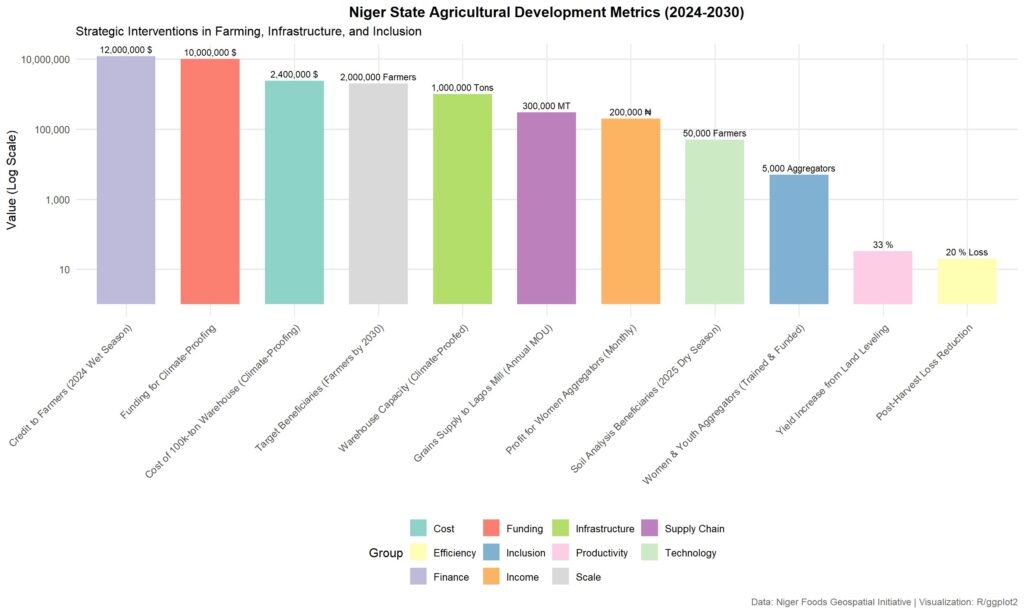Key Agricultural Metrics and Targets for Niger State (2024–2030)

The data presented in the graph above outlines a comprehensive agricultural development initiative designed to enhance the livelihoods of smallholder farmers, minimize post-harvest losses, and strengthen the grains value chain in Nigeria. The initiative aims to reach 2 million smallholder farmers by 2030, ensuring broad inclusivity and scalability. Currently, post-harvest losses stand at 20%, with significant losses occurring during farm storage (6–7%), milling (4–5%), and warehousing (3%). Addressing these losses is crucial for improving food security and enhancing farmer incomes. To mitigate these losses, the initiative plans to develop 1,000,000 tons of climate-proofed warehouse storage, with each 100,000-ton facility costing $1.4 million, inclusive of climate-proofing measures.
To support farmers, $12 million in credit will be allocated for the 2024 wet season, while 5,000 women and youth aggregators will undergo specialized training. Additionally, N2.5 billion will be disbursed to support their activities. The economic impact of these efforts is significant, as women aggregators are projected to earn N50,000 weekly and N200,000 monthly, demonstrating the initiative’s potential to drive grassroots economic empowerment. In ensuring stable grain supply, a strategic Memorandum of Understanding (MOU) with Lagos State guarantees an annual supply of 300,000 metric tons (MT) of grains to Lagos-based mills, offering a reliable market for farmers.
Efforts to enhance agricultural productivity include soil analysis services targeted at 50,000 farmers during the 2025 dry season, which will enable precision agriculture and improved yields. Additionally, land leveling initiatives are projected to enhance crop yields by up to 33%, depending on soil quality and management practices. The initiative also focuses on strengthening the grains value chain by supporting SME cottage industries, improving business management, and promoting food safety standards. To ensure long-term resilience, a dedicated $10 million fund, sourced from internal financing and commercial borrowings, has been allocated to fortify climate-proofing measures within agricultural operations.
The initiative employs a multi-dimensional approach to tackling key constraints in Nigeria’s agricultural sector, particularly within the grains value chain. Reducing post-harvest losses is a major priority, as inefficiencies in farm storage, milling, and warehousing currently account for 20% of total grain losses. Climate-proofed warehouses will play a critical role in protecting stored grains from adverse weather conditions and pest infestations. Economic empowerment remains a central objective, with the training and financial inclusion of 5,000 women and youth aggregators highlighting a strong commitment to gender equity and employment generation. The estimated earnings of N50,000 weekly and N200,000 monthly for these aggregators illustrate the program’s potential to drive economic transformation at the grassroots level.
Improving soil health and productivity is another key pillar of the initiative. Soil analysis services for 50,000 farmers and targeted land leveling efforts are expected to boost yields by up to 33%. These interventions will improve soil fertility, optimize water management, and enhance overall agricultural resilience. Strengthening SME cottage industries, improving business management capacities, and ensuring food safety will also reinforce the grains value chain and promote sustainable agricultural practices. Furthermore, the MOU with Lagos State secures a consistent and lucrative market for grains, promoting stability for farmers and reducing market volatility.
Another critical aspect of the initiative is climate resilience. The $10 million investment in climate-proofing demonstrates a commitment to safeguarding agricultural productivity against climate variability. Given Nigeria’s vulnerability to erratic weather patterns, such measures are essential to ensuring sustainable food production and protecting farmers from climate-induced losses.
The initiative holds significant potential to transform Nigeria’s agricultural sector, particularly within the grains value chain. By reducing post-harvest losses and optimizing yields, smallholder farmers will experience substantial income growth, contributing to rural poverty alleviation. The combination of loss reduction strategies and increased grain production will bolster national food security by ensuring greater food availability and affordability. Furthermore, by fostering skills development and providing financial support, the initiative will create sustainable economic opportunities for women and young entrepreneurs, reducing unemployment rates and enhancing financial independence.
Investments in climate-proofing and land management will also enhance the agricultural sector’s ability to withstand climate-related shocks, ensuring year-round productivity. Strengthening SME cottage industries and improving business management will stimulate value addition, foster job creation, and contribute to overall economic growth. Market access is further strengthened through the MOU with Lagos State, which guarantees a stable market for grains, providing farmers with predictable revenue streams and encouraging increased production. With a strategic goal of reaching 2 million smallholder farmers by 2030, the initiative is designed for large-scale implementation, ensuring long-term benefits across Nigeria’s agricultural landscape.
For More tabular details please refer to this :
Table 1: Facts and Figures (I)
Category | Details |
Target Beneficiaries | 2,000,000 smallholder farmers by 2030 |
Post-Harvest Losses | 20% (6-7% from farm storage, 4-5% from milling, 3% from warehousing) |
Warehouse Capacity | 1,000,000 tons (climate-proofed) |
Cost of 100,000-ton Warehouse | 1million(conventional),+1million(conventional),+400,000 for climate-proofing |
Credit Provided to Farmers | $12 million (2024 wet season) |
Women & Youth Aggregators | 5,000 trained, N2.5 billion disbursed, 500,000 MT grains aggregated |
Profit for Women Aggregators | N50,000 weekly, N200,000 monthly |
Grains Supply to Lagos Mill | 300,000 MT annually (MOU with Lagos State) |
Soil Analysis Beneficiaries | 50,000 farmers targeted for 2025 dry season |
Yield Increase from Land Leveling | Up to 33% (depending on soil quality) |
Grains Value Chain Improvement | Focus on SME cottage industries, business management, and food safety |
Funding for Climate-Proofing | $10 million (partially from internal funds and commercial borrowings) |
Source: Niger Foods Compilation 2024